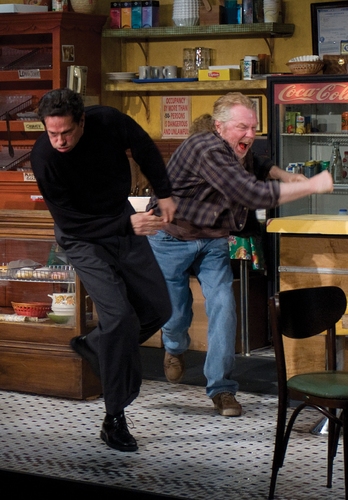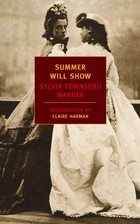I’m back on Broadway after a long absence, but you wouldn’t know it by this week’s Wall Street Journal drama column, in which I rave (albeit with some judicious reservations) about two new plays, A Steady Rain and Superior Donuts, that both originated in Chicago. Here’s an excerpt.
* * *
 Chicago has come to Broadway–with a great big bang. Two new plays by Chicago-based writers, Keith Huff’s “A Steady Rain” and Tracy Letts’ “Superior Donuts,” opened across the street from one another this week. Not only are both shows set to become box-office hits, but both are characteristic of Chicagoland theater at its gritty, no-nonsense best. The difference is that while “Superior Donuts” is a straight Chicago-to-New-York transfer of the Steppenwolf Theatre Company production, “A Steady Rain” is a made-for-Broadway remounting that features two movie stars, Daniel Craig (“Casino Royale”) and Hugh Jackman (“X-Men”), whose real-life accents are unmistakably un-American.
Chicago has come to Broadway–with a great big bang. Two new plays by Chicago-based writers, Keith Huff’s “A Steady Rain” and Tracy Letts’ “Superior Donuts,” opened across the street from one another this week. Not only are both shows set to become box-office hits, but both are characteristic of Chicagoland theater at its gritty, no-nonsense best. The difference is that while “Superior Donuts” is a straight Chicago-to-New-York transfer of the Steppenwolf Theatre Company production, “A Steady Rain” is a made-for-Broadway remounting that features two movie stars, Daniel Craig (“Casino Royale”) and Hugh Jackman (“X-Men”), whose real-life accents are unmistakably un-American.
Why does this matter? Because Messrs. Craig and Jackman are playing a pair of beat cops from the south side of Chicago, the first slightly bent and the second crooked as a twice-bought pol, who talk the spiky talk of the streets where they grew up (“I known the guy since kinnygarten”). In a two-man play, especially one written by a sharp-eared Chicago author whose father-in-law and brother-in-law were policemen, American audiences have a right to expect the actors to sound like the characters they’re playing. Mr. Craig, a British actor with classical training and a wide variety of stage experience, manages this tricky task with cool aplomb, tunnelling so far inside his part that it’s easy to forget who’s playing it. Mr. Jackman does his damnedest to keep up, but Australian vowels occasionally peep through the nasal snarl of his ersatz Chicago accent, and though he gives a strong, satisfying performance, you’re always aware that it is a performance.
Not that this diminishes the gut-level impact of “A Steady Rain,” an irresistibly forceful exercise in noir-style tandem storytelling in which the hushed audience watches Mr. Jackman’s character hurtle headlong toward the abyss of self-destruction…
If “A Steady Rain” is the theatrical equivalent of a Scott Turow novel, then “Superior Donuts” is “You Can’t Take It With You” rewritten by David Mamet, a dark comedy about a workplace “family” of charmingly wacky characters who suddenly find themselves caught in the deadly undertow of reality. The setting is a rundown six-stool donut shop in uptown Chicago whose proprietor, Arthur Przybyszewski (played to perfection by Michael McKean), is a burnt-out hippie whose hard shell of cynicism is cracked open by a young black man (Jon Michael Hill) who fast-talks his way into a job behind the counter. Much of what happens thereafter is obvious, but not all–the audience at the preview I saw gasped twice, both times loudly, at a surprising plot twist–and Mr. Letts, who is best known on Broadway as the author of “August: Osage County,” takes scrupulous care to balance laughter and sorrow in exactly the right proportions….
* * *
Read the whole thing here.
Archives for 2009
TT: Almanac
“Indefinitiveness is an element of true music–I mean of true musical expression. Give to it any undue decision–imbue it with any very determinate tone–and you deprive it, at once, of its ethereal, its ideal, its intrinsic and essential character. You dispel its luxury of dream. You dissolve the atmosphere of the mystic upon which it floats.”
Edgar Allan Poe, Marginalia
CAAF: A few things I’m into right now
• “Samba Triste,” performed by a young Baden Powell.
• Karen Russell’s “Vampires In The Lemon Grove“: Originally appeared in Zoetrope and is included in Best American Short Stories 2008, edited by Salman Rushdie. Worth searching out.
• Two nonfiction books: Rebecca Solnit’s history of walking, Wanderlust, and Sarah Hrdy’s Mother Nature: Maternal Instincts and How They Shape the Human Species, the latter recommended by Steph. Neither are about topics I’d have thought I’d find interesting — and yet they’re both fascinating. Both definitely of the fox, not hedgehog school.
• Summer Will Show, of course.
• Werner Herzog: My new thing is to watch a Herzog double feature on the weekends, Werner Herzog Sundays!, a ritual I plan to keep up for at least a few more weeks. The first weekend was My Best Fiend: Klaus Kinski and Grizzly Man, which worked well back to back as character studies. Next were the Les Blank-directed documentaries about Herzog: Burden of Dreams and Werner Herzog Eats His Shoe. I’ll be away this weekend, but the one after will be Fitzcarraldo and I don’t know what. Maybe filling out an application for Herzog’s Rogue Film School.
THE GREATER OF TWO LOESSERS
“Frank Loesser’s standing as a giant of American popular song would be secure even if he had written nothing but Guys and Dolls, one of a handful of postwar musicals to have received three Broadway revivals, the second of which ran almost as long as the original production. It is the quintessential Broadway show, a vade mecum of theatrical craft–and the long road that led Loesser to its opening night is in some ways as interesting as the show itself…”
TT: So you want to see a show?
Here’s my list of recommended Broadway, off-Broadway, and out-of-town shows, updated weekly. In all cases, I gave these shows favorable reviews (if sometimes qualifiedly so) in The Wall Street Journal when they opened. For more information, click on the title.
Warning: Broadway shows marked with an asterisk were sold out, or nearly so, last week.
BROADWAY:
• Alfred Hitchcock’s The 39 Steps (comedy, G, suitable for bright children, closes Jan. 10, reviewed here)
• God of Carnage * (serious comedy, PG-13, adult subject matter, closes Jan. 3, reviewed here)
• South Pacific (musical, G/PG-13, some sexual content, brilliantly staged but unsuitable for viewers acutely allergic to preachiness, reviewed here)
OFF BROADWAY:
• The Fantasticks (musical, G, suitable for children capable of enjoying a love story, reviewed here)
• Our Town (drama, G, suitable for mature children, reviewed here)
IN ASHLAND, OREGON:
• The Music Man (musical, G, very child-friendly, closes Nov. 1, reviewed here)
IN STRATFORD, ONTARIO:
• The Importance of Being Earnest (comedy, G, closes Oct. 30, reviewed here)
CLOSING SOON IN CHICAGO:
• The History Boys (drama, PG-13/R, adult subject matter, too intellectually complex for most adolescents, closes Oct. 18, reviewed here)
CLOSING SOON IN SPRING GREEN, WIS:
• Long Day’s Journey into Night (drama, PG-13, adult subject matter, too long and demanding for some adolescents, closes Oct. 18, reviewed here)
CLOSING NEXT WEEK IN PROVIDENCE, R.I..:
• Cabaret (musical, PG-13, closes Oct. 11, reviewed here)
CLOSING FRIDAY IN SPRING GREEN, WIS.:
• Henry V (Shakespeare, G, reviewed here)
CLOSING SATURDAY IN STRATFORD, ONTARIO:
• Three Sisters (drama, PG-13, reviewed here)
CLOSING SUNDAY IN ARLINGTON, VA.:
• Dirty Blonde (serious comedy, PG-13, adult subject matter, reviewed here)
CLOSING SUNDAY IN ST. LOUIS, MO.:
• Amadeus (drama, PG-13, reviewed here)
TT: Almanac
“When I hear music, I fear no danger. I am invulnerable. I see no foe. I am related to the earliest times, and to the latest.”
Henry David Thoreau, journal entry, Jan. 13, 1857
CAAF: Summertime
 I’m reading Sylvia Townsend Warner’s Summer Will Show right now. It’s about an Englishwoman who runs away to Paris and falls in love with her husband’s mistress. I’d been wanting to read it ever since Sarah Waters named it as one of her favorite novels. At the time, it was out of print. But NYRB Classics reissued the novel this August, and I really think you couldn’t do better than to get yourself a copy.
I’m reading Sylvia Townsend Warner’s Summer Will Show right now. It’s about an Englishwoman who runs away to Paris and falls in love with her husband’s mistress. I’d been wanting to read it ever since Sarah Waters named it as one of her favorite novels. At the time, it was out of print. But NYRB Classics reissued the novel this August, and I really think you couldn’t do better than to get yourself a copy.
Warner was a poet as well as a novelist, and as I read I find myself admiring how this shows in how she works her sentences. It sounds like a deadly dull thing to praise, a writer’s sentences, maybe because its praise that often gets awarded to books that are stultifying (meditations on a woodpile and changing cloud patterns and something-something about mortality and oh my god what page am I on it is only page 23). But the fact is Warner’s sentences are unusually beautiful, and I keep wondering what it is about them that makes them so.
One particular thing I’ve noticed is the ratio of Latinate to Anglo-Saxon in the paragraphs. Warner’s a very elegant stylist, and one danger of “elegant prose” is how easily it can become overly smooth and glassy. And then the reader slips right off the face of it. One of Warner’s tricks is to pop in an Anglo-Saxon-rooted word here and there that’s not only a good, just-right word, it also works like a prick to keep the paragraph from growing too smooth.
Example of elegance that would become glassy if the entire novel were like this:
Together they would look out of the window at the unfinished Ste. Clotilde, and an artistic conversation would take place, Père Hyacinthe with roulades of language expatiating on the beauties of the Gothic Frederick supplying cadences of agreement, till the two voices joined, as it were, in a duet, aspiring in thirds and sixths …
Example of a prick in the elegance:
The pleasures of avarice were emphasized by the surroundings. It was difficult to believe that this was Paris, so nipped and dingy did it look, so down-hearted and down-at-heel. A shrewish wind was blowing.
The “shrewish” is good, but the “nipped” is perfect.
Another prick:
The smell of the sea, melancholy like a whine, rose from the filthy clucking water.
The inverse, of course, is also true. Sometimes the elegance extends and makes beautiful what would otherwise be ordinary. Here is a sentence that could have been “and they breakfasted on coffee, bread and sausage”:
Some tin coffeepots, long wands of golden bread, a sausage in a paper chemise, gave a domesticated appearance to the barricade.
CAAF: Exercise with the authors: Charles Dickens

With the recent glut of self-help books based on the works of great authors, I’ve been amusing myself with mock proposals, my favorite so far being Six-Pack Abs With Charles Bukowski. Another idea is a more generalized “exercise with the authors!”-type encyclopedia. Charles Dickens would have the first entry. From Jane Smiley’s Penguin Lives biography:
It was in this period [1838ish] that he took up the habit of long, vigorous daily walks that seem almost unimaginable today for an otherwise very busy man with many obligations. At a pace of twelve to fifteen minutes per mile, he regularly covered twenty and sometimes thirty miles. Returning, as his brother-in-law said, “he looked the personification of energy, which seemed to ooze from every pore as from some hidden reservoir…”
I think of this often as last year I received a fancy GPS-style watch with which to track my walking/jogging (or “wogging”). It was a very generous present, but it’s taken a lot of illusion out of my life. For example, pictured above is an overlook I walk to quite a bit that, if you asked me before, I would have told you was roughly a four-mile walk but which turns out to be more like two.
(If you have any similar “authors who exercise” tidbits, please feel free to share by email.)
